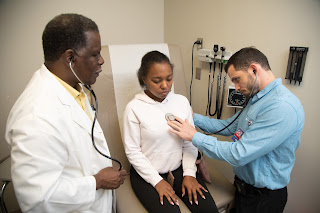 |
Athira Nair, M.D., assistant professor of pediatric cardiology, listens to a baby's heart. |
Nair’s areas of expertise include congenital heart disease, fetal cardiology, arrhythmia and diseases such as obesity and high cholesterol. Most recently, Nair served as an assistant clinical professor for pediatric cardiology at the University of California San Francisco in Fresno, Calif., where she worked for four years.
In her new role with the region’s only academic health system, Nair is an assistant professor of pediatric cardiology at the USA College of Medicine.
David Gremse, M.D., professor and chair of pediatrics at the USA College of Medicine, said there is a critical need for more pediatric cardiologists in Alabama. The state has 1.73 pediatric cardiologists per 100,000 children, which is the lowest in the Southeast and well below the national average of 3.5.
“Not only will Dr. Nair increase the access to care for children in need of a pediatric cardiologist, but she will also bring added expertise in advanced cardiac imaging, such as cardiac MRI in children,” he said.
Nair is working alongside Lynn Batten, M.D., associate professor of pediatrics at the USA College of Medicine and director of USA Health’s Division of Pediatric Cardiology. “I am very excited to have Dr. Nair join me, not only because congenital heart disease is the No. 1 birth defect, but also because she has special interests in dysautonomia, pulmonary hypertension, hyperlipidemia and obesity. We are seeing these health conditions with increasing frequency in our area, and I am delighted that USA Health can expand our services for these patients,” Batten said.
Nair said she was attracted to USA Health because of the diverse health needs presented by our patient population. She also was drawn to caring for children with heart issues because of the constant opportunities for growth.
“You can’t get comfortable in it, because every day is unpredictable in pediatric cardiology,” she said. “Every patient is a challenge, and you are constantly learning. I wanted that challenge. I want to take this technology and my knowledge, and apply it to the rest of the world.”
In addition to pediatric cardiology, Nair also is deeply interested in global health issues and has performed mission work in underserved areas where people had little to no access to adequate healthcare.
She hopes to contribute to diversifying and optimizing patient care at USA Health.
Nair received a medical degree from Amrita Institute of Medical Science in Kochi, India. She completed residency training in pediatrics at UF Health Shands Children’s Hospital in Gainesville, Fla., and a pediatric cardiology fellowship at Hershey Medical Center in Hershey, Pa. She is board certified in pediatric cardiology by the American Board of Pediatrics.





